Egypt's president pulls back on power decree, pushes referendum
The move was an apparent
attempt to end a political crisis that has spilled into the streets,
pitting the president's supporters and opponents against one another and
raising questions about Morsy's ability to lead the fragile democracy.
Almost as soon as adviser Mohamed Selim el-Awwa laid out the offer, many in the opposition dismissed it.
The cancellation of the
decree, which put Morsy's decisions above judicial oversight, was not
retroactive, meaning any decisions he made since its announcement still
stand. Those decisions, which include the approval of the draft
constitution, cannot be challenged by the courts.
Also, the president did not postpone a December 15 referendum on the draft constitution, as protesters demand.
The development came after a meeting at the presidential palace that many in the opposition boycotted.
"This is a farce," said
Ahmed Selim, a member of the opposition April 6 youth movement, vowing
to "take to the streets nationwide to continue to protest this dictator
and his stubbornness."
"We are not fools and this new decree serves no one but his followers," Selim said.
In contrast, Ayman Nour,
an opposition leader who attended the meeting at the palace, described
the cancellation of the decree as a positive step.
"(It) has opened the door to a possible solution to a national crisis and may calm the situation down," he said.
Egyptian authorities
said at least six people have been killed in violent clashes in recent
days, while the Muslim Brotherhood -- the group that backs Morsy -- has
said eight of its members were killed.
The crisis erupted in
late November when Morsy issued the edict allowing himself to run the
country unchecked until a new constitution was drafted, a move that sat
uncomfortably with many Egyptians who said it reminded them of ousted
President Hosni Mubarak's rule.
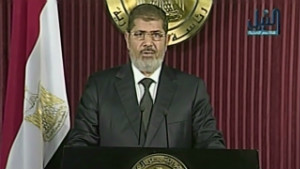 Political crisis in Egypt
Political crisis in Egypt
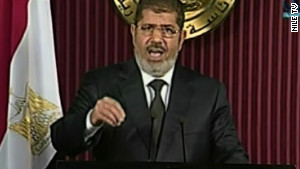 Morsy: I will not allow murder, sabotage
Morsy: I will not allow murder, sabotage
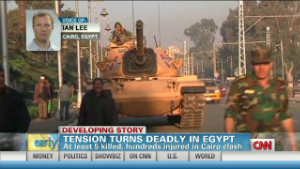 Tensions in Egypt turn deadly
Tensions in Egypt turn deadly
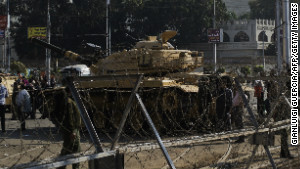 Chaos in Cairo
Chaos in Cairo
Morsy had said the powers were necessary and temporary. But that promise did little to quiet the opposition.
Anger at Morsy's move
led to protesters reoccupying Tahrir Square, the scene of the Arab
Spring uprising that saw Mubarak ousted in 2011. Thousands later
protested outside the palace, where the opposition clashed with the
Muslim Brotherhood.
The anger only grew when
the Islamist-dominated Constitutional Assembly pushed through a draft
despite the objections of the secular opposition, including some members
who walked out in protest. Tens of thousands of protesters -- for and
against Morsy -- took to the streets.
A coalition of Egyptian
Islamic parties, including the Brotherhood, rejects any postponement in
the constitutional referendum, the Islamic Forces Alliance announced
Saturday on the Brotherhood website.
The deputy head of Muslim Brotherhood, Khairet El-Shatir, also read the Alliance's statement in a press conference.
The Alliance won't allow
under any circumstance the return of the corrupt Mubarak regime.
El-Shatir said. The Alliance includes 13 parties such as the Al-Nour
party and the Salafist front.
The statement also warned against manipulating the will of the people by forcefully overtaking the state.
"We assure the Egyptian
people that the Alliance of the Islamic Forces is very keen to preserve
the security of the homeland, stopping the bloodshed," El-Shatir said.
Egypt's military
leaders, who took control of the country after Mubarak's ouster, were
keeping a wary eye on the developments, according to a statement
released by the Egyptian armed forces and read on state-media.
"The armed forces are
watching with sadness and worries the current developments in the
country, with its consequences and how it led to divisions," the
statement said, according to state media.
"We stress that dialogue
is the ideal and only solution to reach an agreement that realizes the
interests of the nation and its citizens. Anything other than that will
lead us into a dark tunnel with catastrophic consequences, which we will
never allow to happen."
Adel Saeed, a spokesman
for Egypt's newly appointed general prosecutor, said Friday morning that
opposition figures Hamdeen Sabahy, Mohamed El Baradei and Amr Moussa
are being investigated for allegedly "conspiring to topple" the
government.
All three are well-known
internationally; ElBaradei being a Nobel Peace Prize laureate. Moussa a
onetime head of the Arab League, and Sabahy is an Egyptian political
figure. They are now being probed for their role in the opposition
against Morsy.
ElBaradei said on
Twitter: "I call upon all the national forces and figures not to
participate in a dialogue that lacks all the basics of a truthful
discourse. We support a dialogue that is not based on the policy of
arm-twisting and forcing the status quo."
Those taking part in the
protests around the North African nation say the scenes are similar to
those of the 2011 uprising that led to Mubarak's ouster. This time, they
say, dissent is being vigorously stamped out by Morsy's backers in
government and on the street.
Specifically, they spoke
of thugs with knives and rocks chasing activists, presidential backers
belittling opponents and pressure from various quarters to go home and
be quiet.
"It's exactly the same battle," said Hasan Amin, a CNN iReporter.

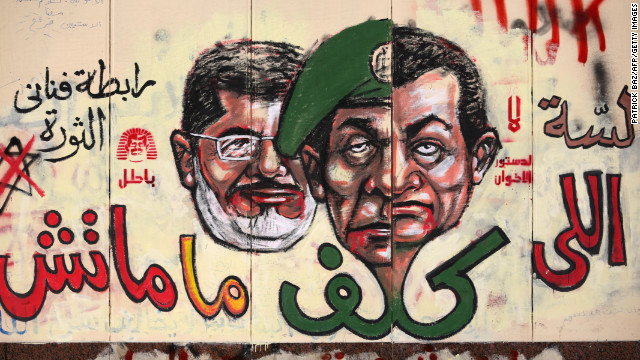 Graffiti depicting Egyptian
President Mohamed Morsy (L), ousted president Hosni Mubarak (R) and
former head of the army Field Marshal Mohammed Hussein Tantawi (C) cover
the walls outside the presidential palace in Cairo, where
demonstrations against Morsy's judicial decree have consumed the capital
recently.
Graffiti depicting Egyptian
President Mohamed Morsy (L), ousted president Hosni Mubarak (R) and
former head of the army Field Marshal Mohammed Hussein Tantawi (C) cover
the walls outside the presidential palace in Cairo, where
demonstrations against Morsy's judicial decree have consumed the capital
recently.
No comments:
Post a Comment